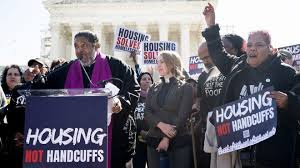(This reflection was shared today at Interfaith Communities United for Justice and Peace.)
The sabbatical that Jill and I have been
on since May 1 is coming to an end. On Monday, we’ll be back in the saddle,
working on housing justice with our nonprofit, Making Housing and Community
Happen.
While we were on sabbatical, the conservative
justices on the Supreme Court made a deplorable decision in response to a
lawsuit against the city of Grants Pass, Oregon. Grants Pass fines and arrests unhoused people
for being homeless, even though the city doesn’t provide a shelter or any other
place where unhoused people can sleep. The conservative justices on the court
decided that cities could fine or arrest an unhoused people for sleeping on the
street or in their car even though a previous ruling described this as “cruel
and unusual punishment.” I’d like to
share with you excerpts from an article that explains the implications of this
decision.
Supreme
Court Justice Sonia Sotomayor issued a scathing dissent on her conservative
colleagues’ decisions to essentially criminalize
homelessness.
While
the conservative majority argued that the high court must not impede local
governments from criminalizing homelessness, Sotomayor wrote, “It is possible
to acknowledge and balance the issues facing local governments, the humanity
and dignity of homeless people, and our constitutional principles.”
“The
City of Grants Pass jails and fines those people for sleeping anywhere in
public at any time, including in their cars, if they use as little as a blanket
to keep warm or a rolled-up shirt as a pillow,” Sotomayor wrote. “For people
with no access to shelter, that punishes them for being homeless. That is
unconscionable and unconstitutional. Punishing people for their status is
‘cruel and unusual’ under the Eighth Amendment.”
Going
on to quote social science experts, Sotomayor explained how punishing people
for sleeping outside without providing offers to housing and available beds is
simply “a big game of whack-a-mole.”
While
the conservative justices trumpeted tropes about unsheltered homeless people
being service-resistant, or denying shelter when offered, Sotomayor noted
studies have shown that “the vast majority of those who are unsheltered would
move inside if safe and affordable options were available.” Shawn Morrissey,
who currently works for Union Station Homeless Services here in Pasadena, experienced homelessness for 11 years and has
worked for many years to help find housing for unhoused people. He says that unhoused
people sometimes have to be approached many times to build trust, but he has
never encountered an unhoused person who didn’t want to be housed.
When
people resist being housed, notes Sotomeyer, it’s often because those beds that
are available may have “restrictions based on gender, age, income, sexuality,
religious practice, curfews that conflict with employment obligations, and time
limits on stays.” For example, the only shelter in Grants Pass, which is
charity-run, has strict religious and work requirements. I would add that women
and the mentally ill sometimes don’t feel safe in congregate shelters because
they fear being harassed.
The
Supreme Court’s ruling on this case will allow cities and states to avoid the
offer of shelter entirely if they so choose and offers one solution to
homelessness: punishment.
As
Sotomayor wrote, imposing fines and jailing individuals is not a solution. In
her dissent, which she read from the bench, the justice described a story of a
homeless man in Nashville who was arrested 198 times and had over 250
citations, making it difficult for an outreach worker to find him housing. The
outreach worker was eventually forced to make him a T-shirt that read, “Please
do not arrest me, my outreach worker is working on my housing.” Once the man,
who experienced homelessness for 20 years, was able to secure stable housing,
he “had no further encounters with the police, no citations, and no arrests.”
The Supreme Court has given permission
to cities to punish people for being unhoused, but Governor Newsom has gone a
step further and requires cities to adopt a punitive approach. He issued
a dreadful edict calling on cities to clear encampments or face consequences,
such as loss of funding.
Newsom’s edict encourages cities to
follow the example of Grants Pass, and puts pressure on cities like Pasadena, Los
Angeles and Long Beach who have up to now taken a more reasonable and humane
approach.
We know what ends homelessness, and
that’s housing. For chronically unhoused people, that means permanent housing,
not temporary shelters, with wrap-around services to help them find jobs and
deal with issues addiction and mental illness. Over 90% of chronically unhoused
people who’ve been housed in our city have remained housed. And because we have
a strong coalition of churches, activists, service providers and elected
officials, Pasadena has reduced its homeless count by over 50% in the last
decade. Because of the Supreme Court’s shameful decision, and Newsom’s edict,
the Pasadena City Council has agendized a discussion of the Grants Pass
decision on September 9. I plan to be there, along with other housing justice advocates,
to say that we must house, not criminalize, our unhoused neighbors. As a person
of faith, I feel it’s our responsibility to do what we are told in Proverb
31:9: “Speak up for the people who have no voice, for the rights of all the
oppressed. Speak out for justice! Stand up for
the poor and
destitute!” Can I get an amen?


No comments:
Post a Comment